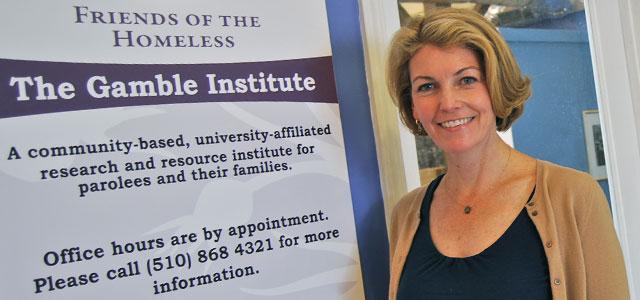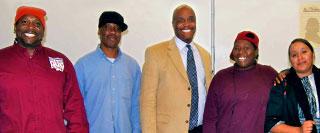
Elizabeth Marlow, PhD, FNP
Straight Time
Elizabeth Marlow remembers sweating over the first few papers assigned to her as a doctoral student at UC San Francisco School of Nursing. Even with a bachelor’s degree from Boston University and a master’s in nursing from Yale, she was out of practice writing research papers.
Today she works with adults for whom writing a basic college paper can truly be a terrifying experience. These men and women, recently released from California’s prisons, are taking their first college courses at Oakland’s Merritt College.
Marlow helps in her role as co-founder and executive director of The Gamble Institute. This four-year-old nonprofit, with the motto “for parolees, by parolees,” is launching a new program to provide academic peer mentoring and other support services for ex-offenders enrolled at Merritt College. Marlow and her colleagues hope to give these students a chance to rebuild their lives by pursuing college degrees.
“One of our hypotheses is that people who can stay in school for longer are going to be less likely to go back to prison,” says Marlow, a nurse practitioner and assistant adjunct clinical professor at UCSF School of Nursing.
Breaking a Cycle
Marlow has learned in nearly 20 years of clinical practice that it is difficult for ex-offenders to avoid slipping back into crime and drug habits that contribute to their return to prison.
Every year, more than 100,000 men and women are released from California prisons. The system typically gives them $200 and a mandate to stay out of trouble. Otherwise, these parolees are mostly left on their own. They must find jobs and housing while their personal relationships may be in turmoil; many are dealing with substance abuse problems. A 2010 study by The National Center on Addiction and Substance Abuse at Columbia University estimated that 65 percent of the nation’s 2.3 million state and federal prison inmates met the criteria for drug and alcohol addiction.
It doesn’t help that many former inmates have barely finished high school, leaving them without the skills needed in a 21st-century knowledge-based economy.
“They haven’t been to school in years and don’t have basic study skills,” says Marlow. “These are things that many people learn going to elementary or high school. A lot of our clients just have the experience of being in jail.”
With the odds against them, it comes as no surprise to many in corrections that parolees often reoffend or violate terms of their parole. According to the California Department of Corrections and Rehabilitation, about 64 percent of inmates released during the 2007-2008 fiscal year were sent back within three years, making California’s recidivism rate the highest in the nation.
The Gamble Difference
What defines The Gamble Institute (TGI) is Marlow’s interest, as a nurse scientist, in developing research-based interventions that focus on peer mentoring. The institute has received $10,000 from UCSF School of Nursing intramural funding to study reintegration programs, including looking at recidivism outcomes.
The institute’s backbone is its “Street Scholars” program, a team of five previously incarcerated adults who are current or former students at Merritt College. They serve as role models, showing how opportunities open up to parolees who work toward college degrees.
 Street Scholars, from left: Earthy Young, Marcus Austin, Ron Moss, Yema Lee, Victoria Perez West Oakland native Yema Lee, 39, had been cycling in and out of prison for drug and assault crimes until her most recent release in January 2010. Her life changed when she found her way to TGI. She started taking computer classes and became friends with Marlow, whom she credits with inspiring her to change. “Elizabeth is just such a cool person, and she shared with me her different ideas about how to build the program. I just wanted to be involved,” says Lee.
Street Scholars, from left: Earthy Young, Marcus Austin, Ron Moss, Yema Lee, Victoria Perez West Oakland native Yema Lee, 39, had been cycling in and out of prison for drug and assault crimes until her most recent release in January 2010. Her life changed when she found her way to TGI. She started taking computer classes and became friends with Marlow, whom she credits with inspiring her to change. “Elizabeth is just such a cool person, and she shared with me her different ideas about how to build the program. I just wanted to be involved,” says Lee.
Now Lee is studying human services at Merritt College and helping Marlow and other Street Scholars organize programs. Lee and her colleagues have also told their stories at lectures Marlow has presented to nursing and public health students at UCSF and University of San Francisco.
Though she still lacks permanent housing and struggles with mental illness, Lee now has reasons to not fall back into drugs or crime. She loves being in school and is focused on one day opening a residential program for people with schizophrenia.
“I never thought I’d go to college,” she says. “It’s opened my eyes to other opportunities, and I can foresee my long-term goal coming true.”
Dedicated to Service
While she was growing up in the affluent East Bay suburb of Walnut Creek, Marlow’s family valued public service.
The Gamble Institute is named in honor of Marlow’s grandfather, E. Lee Gamble, a civic-minded professor of chemistry at the Massachusetts Institute of Technology. For high school, Marlow attended The Athenian School, a private East Bay prep school known for its community service requirements for graduation. “They required 36 [hours] and I did [about] 200. I was really into service,” she says.
After graduating from Boston University with a bachelor’s degree in art history, she contemplated becoming a social worker. Then, while she was working as a secretary at the Dana-Farber Cancer Institute in Boston, nurse practitioners there convinced her that being an NP offered a wide range of opportunities to do public service, as well as to provide primary care and mental health counseling.
After earning a master’s degree from Yale, Marlow chose a nursing position at a community health center in Bakersfield, a Kern County agricultural town known in the criminal justice world for its proximity to some of California’s largest prisons.
She immediately discovered she enjoyed helping patients who were former inmates. “I didn’t know anything about prison or parole, but as I started to get to know them, I found that I liked them and they liked me,” says Marlow, who today is beloved by her TGI colleagues for her easygoing manner and commitment to helping them become productive members of society. She recalls being struck by the former inmates’ intelligence and good hearts – and wondering why they struggled to make a go of it outside of prison.
When she returned to the Bay Area in 1998, she spent two years as the program coordinator for the UCSF Diabetes Teaching Center before becoming a nurse practitioner for the Alameda County Health Care for the Homeless Program, where she provided care to ex-offenders. In 2006, she left this position to complete her dissertation, which studied the impact of community health care access on the reintegration of middle-aged, chronically ill male parolees. Since 2008, she has worked as a nurse practitioner for the San Francisco County Jail.
Learning from the Experts
She calls Lee and other Street Scholars the experts who teach her as much as she teaches them. For instance, she is fascinated by the perspective of Earthy Young, who often says he benefited from serving 26 years in prison. He was sentenced to 15 years to life for a homicide he committed in an alcoholic blackout.
 Earthy Young “Prison was a cruel place, and we always had to be on guard,” acknowledges the gentle-faced Young, 52. During his first years in prison, he chose to stop being angry. He worked on his spiritual growth while training in a range of vocations and gaining practice in substance abuse counseling and nonviolent communication. He calls prison his “college.”
Earthy Young “Prison was a cruel place, and we always had to be on guard,” acknowledges the gentle-faced Young, 52. During his first years in prison, he chose to stop being angry. He worked on his spiritual growth while training in a range of vocations and gaining practice in substance abuse counseling and nonviolent communication. He calls prison his “college.”
“I can actually see how prison can be a good thing,” he says. “I see a lot of strength in there. I’ve seen a lot of power in there.”
Now Young is studying environmental management at Merritt. He and other street scholars are preparing to mentor incoming students by receiving specialized training in helping others cope with academic stress, organize their study time and apply for financial aid. They will also connect students with resources to find housing, jobs and health care, including treatment for substance abuse problems. They and Marlow will be gathering data to test the effectiveness of their interventions.
It will be a challenge, for at Merritt, a two-year community college, only about 1 percent of formerly incarcerated students complete their associate’s degree. Marlow says, “Just getting them to finish a semester is huge.”
She and her Street Scholars want to help students get through that first semester, and then the next. She’s encouraged by early results showing that their nonviolent communication training helped 30 male participants gain empathy and skills in coping with their addictions, according to a study published in the Journal of Correctional Health Care.
Today Marlow is excited about TGI’s prospects. “Many times I would think this isn’t going to work,” she says. “It’s just taken a long time to find the right people to work with, people who want to be involved and can focus on the work.”



